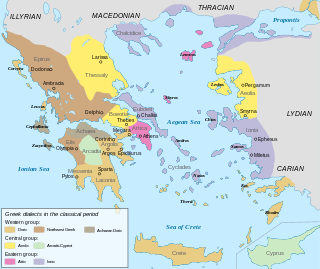 W
WAttic Greek is the Greek dialect of the ancient city-state of Athens. Of the ancient dialects, it is the most similar to later Greek and is the standard form of the language that is studied in ancient Greek language courses. Attic Greek is sometimes included in the Ionic dialect. Together, Attic and Ionic are the primary influences on Modern Greek.
 W
WBryges or Briges is the historical name given to a people of the ancient Balkans. They are generally considered to have been related to the Phrygians, who during classical antiquity lived in western Anatolia. Both names, Bryges and Phrygians, are assumed to be variants of the same root. Based on archaeological evidence, some scholars such as Nicholas Hammond and Eugene N. Borza argue that the Bryges/Phrygians were members of the Lusatian culture that migrated into the southern Balkans during the Late Bronze Age.
 W
WDoric, or Dorian was an Ancient Greek dialect. Its variants were spoken in the southern and eastern Peloponnese as well as in Sicily, Epirus, Southern Italy, Crete, Rhodes, some islands in the southern Aegean Sea and some cities on the south east coast of Anatolia. Together with Northwest Greek, it forms the "Western group" of classical Greek dialects. By Hellenistic times, under the Achaean League, an Achaean-Doric koiné language appeared, exhibiting many peculiarities common to all Doric dialects, which delayed the spread of the Attic-based Koine Greek to the Peloponnese until the 2nd century BC.
 W
WThe Illyrian languages were a group of Indo-European languages that were spoken in the western part of the Balkans in former times by groups identified as Illyrians: Ardiaei, Delmatae, Pannonii, Autariates, Taulantii. Some sound changes from Proto-Indo-European to Illyrian and other language features are deduced from what remains of the Illyrian languages, but because there are no examples of ancient Illyrian literature surviving, it is difficult to clarify its place within the Indo-European language family. Because of the uncertainty, most sources provisionally place Illyrian on its own branch of Indo-European, though its relation to other languages, ancient and modern, continues to be studied.
 W
WIonic Greek was a subdialect of the Attic–Ionic or Eastern dialect group of Ancient Greek.
 W
WPaeonian, sometimes spelled Paionian, is a poorly attested, extinct language spoken by the ancient Paeonians until late antiquity.
 W
WThe name Pelasgians was used by classical Greek writers to refer either to the ancestors or forerunners of the Greeks, or to all inhabitants of Greece before the emergence or arrival of Greeks aware of their Greekness. In general, "Pelasgian" has come to mean more broadly all the indigenous inhabitants of the Aegean Sea region and their cultures, "a hold-all term for any ancient, primitive and presumably indigenous people in the Greek world".
 W
WThe Thracian language is an extinct and poorly attested language, spoken in ancient times in Southeast Europe by the Thracians. The linguistic affinities of the Thracian language are poorly understood, but it is generally agreed that it was an Indo-European language with satem features.